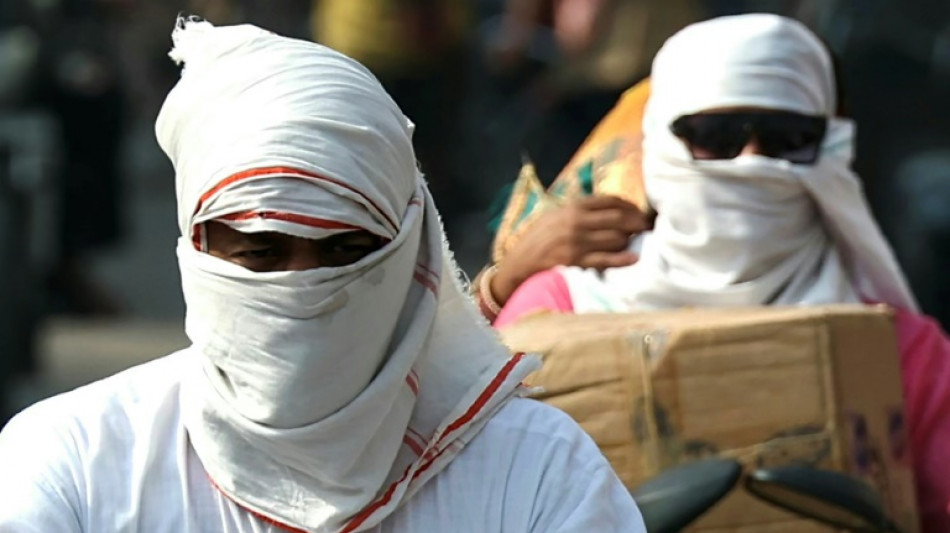
-
 Munsey leads Scotland to 207-4 against Italy at T20 World Cup
Munsey leads Scotland to 207-4 against Italy at T20 World Cup
-
Japan restarts world's biggest nuclear plant again

-
 Bangladesh poll rivals rally on final day of campaign
Bangladesh poll rivals rally on final day of campaign
-
Third impeachment case filed against Philippine VP Duterte

-
 Wallaby winger Nawaqanitawase heads to Japan
Wallaby winger Nawaqanitawase heads to Japan
-
Thailand's Anutin rides wave of nationalism to election victory

-
 Venezuela's Machado says ally kidnapped by armed men after his release
Venezuela's Machado says ally kidnapped by armed men after his release
-
Maye longs for do-over as record Super Bowl bid ends in misery

-
 Seahawks' Walker rushes to Super Bowl MVP honors
Seahawks' Walker rushes to Super Bowl MVP honors
-
Darnold basks in 'special journey' to Super Bowl glory

-
 Japan's Takaichi may struggle to soothe voters and markets
Japan's Takaichi may struggle to soothe voters and markets
-
Seahawks soar to Super Bowl win over Patriots

-
 'Want to go home': Indonesian crew abandoned off Africa demand wages
'Want to go home': Indonesian crew abandoned off Africa demand wages
-
Asian stocks track Wall St rally as Tokyo hits record on Takaichi win

-
 Bad Bunny celebrates Puerto Rico in joyous Super Bowl halftime show
Bad Bunny celebrates Puerto Rico in joyous Super Bowl halftime show
-
Three prominent opposition figures released in Venezuela

-
 Israeli president says 'we shall overcome this evil' at Bondi Beach
Israeli president says 'we shall overcome this evil' at Bondi Beach
-
'Flood' of disinformation ahead of Bangladesh election

-
 Arguments to begin in key US social media addiction trial
Arguments to begin in key US social media addiction trial
-
Agronomics Limited Announces Net Asset Value Calculation as at 31 December 2025

-
 UK-Based Vesalic Limited Emerges from Stealth with Landmark Discovery of Potential Non-CNS Driver of Motor Neuron Diseases, including ALS, and Breakthrough Therapeutic and Diagnostic Opportunities
UK-Based Vesalic Limited Emerges from Stealth with Landmark Discovery of Potential Non-CNS Driver of Motor Neuron Diseases, including ALS, and Breakthrough Therapeutic and Diagnostic Opportunities
-
Gotterup tops Matsuyama in playoff to win Phoenix Open

-
 New Zealand's Christchurch mosque killer appeals conviction
New Zealand's Christchurch mosque killer appeals conviction
-
Leonard's 41 leads Clippers over T-Wolves, Knicks cruise

-
 Trump says China's Xi to visit US 'toward the end of the year'
Trump says China's Xi to visit US 'toward the end of the year'
-
Real Madrid edge Valencia to stay on Barca's tail, Atletico slump

-
 Malinin keeps USA golden in Olympic figure skating team event
Malinin keeps USA golden in Olympic figure skating team event
-
Lebanon building collapse toll rises to 9: civil defence

-
 Real Madrid keep pressure on Barca with tight win at Valencia
Real Madrid keep pressure on Barca with tight win at Valencia
-
PSG trounce Marseille to move back top of Ligue 1

-
 Hong Kong to sentence media mogul Jimmy Lai in national security trial
Hong Kong to sentence media mogul Jimmy Lai in national security trial
-
Lillard will try to match record with third NBA 3-Point title

-
 Vonn breaks leg as crashes out in brutal end to Olympic dream
Vonn breaks leg as crashes out in brutal end to Olympic dream
-
Malinin enters the fray as Japan lead USA in Olympics team skating

-
 Thailand's Anutin readies for coalition talks after election win
Thailand's Anutin readies for coalition talks after election win
-
Fans arrive for Patriots-Seahawks Super Bowl as politics swirl

-
 'Send Help' repeats as N.America box office champ
'Send Help' repeats as N.America box office champ
-
Japan close gap on USA in Winter Olympics team skating event

-
 Liverpool improvement not reflected in results, says Slot
Liverpool improvement not reflected in results, says Slot
-
Japan PM Takaichi basks in election triumph

-
 Machado's close ally released in Venezuela
Machado's close ally released in Venezuela
-
Dimarco helps Inter to eight-point lead in Serie A

-
 Man City 'needed' to beat Liverpool to keep title race alive: Silva
Man City 'needed' to beat Liverpool to keep title race alive: Silva
-
Czech snowboarder Maderova lands shock Olympic parallel giant slalom win

-
 Man City fight back to end Anfield hoodoo and reel in Arsenal
Man City fight back to end Anfield hoodoo and reel in Arsenal
-
Diaz treble helps Bayern crush Hoffenheim and go six clear

-
 US astronaut to take her 3-year-old's cuddly rabbit into space
US astronaut to take her 3-year-old's cuddly rabbit into space
-
Israeli president to honour Bondi Beach attack victims on Australia visit

-
 Apologetic Turkish center Sengun replaces Shai as NBA All-Star
Apologetic Turkish center Sengun replaces Shai as NBA All-Star
-
Romania, Argentina leaders invited to Trump 'Board of Peace' meeting


Experts warn of heat risks as India's temperatures climb again
Extreme temperatures across India are having their worst impact in the country's teeming megacities, experts said Thursday, warning that the heat is fast becoming a public health crisis.
India is enduring a crushing heatwave with temperatures in several cities sizzling well above 45 degrees Celsius (104 degrees Fahrenheit).
Temperature readings in the capital New Delhi rose into the high 40s Celsius this week, with power usage in the city -- where the population is estimated at more than 30 million -- surging to a record high on Wednesday.
"Cities are more vulnerable to the compounding effects of urbanisation and climate change," said Aarti Khosla, director at research institute Climate Trends.
"Expect a greater number of hotter days, prolonged dry spells and less rainy days as weather patterns continue to change due to increased human emissions," she told AFP.
- Heat ward and ice baths -
In Delhi's Ram Manohar Lohia hospital, a specialised unit is busy treating patients with heat-related illnesses.
Equipped with immersion ice baths, the unit has treated eight heat-struck patients in the past week.
One person died Wednesday, medics said, with a body temperature that had surged to a fatal 41.5C (106.7F).
Among those admitted to the unit were manual labourers, most aged between 40 and 50, who work under the blazing sun.
"Treatment depends upon very quick, very rapid intervention and very rapid cooling," hospital director Ajay Shukla said, warning that the mortality rate for severe cases is around "60-80 percent".
The rising temperatures hit the vulnerable the hardest, including those on the economic margins, experts said.
"When the individual is dehydrated, extreme heat exposure will thicken their blood and cause organs to shut down, resulting in death within hours, popularly called 'heat stroke’," said Vidhya Venugopal, director at Sri Ram Institute of Higher Education and Research in Chennai.
"We urgently need... action to protect exposed populations."
- 'About survivability' -
India is no stranger to searing summer temperatures but years of scientific research have found climate change is causing heatwaves to become longer, more frequent and more intense.
The highest confirmed temperature ever recorded in India was 51C (123.8F), in Phalodi on the edge of Rajasthan's Thar Desert in 2016.
Khosla, from Climate Trends, described heatwaves as "the single largest threat to India's well-being today", adding that recent high temperatures were "proof that the issue is now about survivability".
No relief comes at night.
A study published by New Delhi's Centre for Science and Environment (CSE) this month said Indian cities were not cooling down after sunset as much as they had in the decade of 2001-2010.
It found temperatures then had dropped after dusk nearly 2C more than today.
"Hot nights are as dangerous as midday peak temperatures," it said.
"People get little chance to recover from daytime heat... exerting prolonged stress on the body."
- 'Caused by burning coal' -
Researchers say human-induced climate change has driven the devastating heat impact in India and should be taken as a warning.
"The suffering India is facing this week is worse because of climate change, caused by burning coal, oil and gas and deforestation," said Friederike Otto, a climatologist at the Imperial College London and director of World Weather Attribution.
The world's most populous nation is the third-biggest emitter of greenhouse gases but has committed to achieve a net zero emissions economy by 2070 -- two decades after most of the industrialised West.
For now, it is overwhelmingly reliant on coal for power generation.
The government under Prime Minister Narendra Modi, who is seeking a third term in ongoing elections, says the fossil fuel remains central to meeting India's rising energy needs and lifting millions out of poverty.
"What we are seeing in India is exactly what scientists said would happen if we didn't stop heating the planet," Otto said.
O.Karlsson--AMWN


